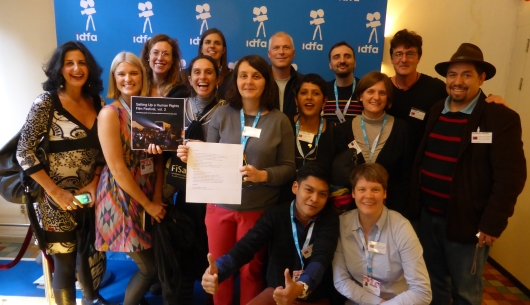To celebrate the 10th anniversary of the Human Rights Film Network (HRFN), the network has released the second edition of Setting Up a Human Rights Film Festival, a comprehensive guide on organizing a human rights film festival. Written by festival organizers from across the globe, this updated edition focuses on the unique challenges faced by festivals in developing countries and those in regions where democratic systems are still emerging or absent.
While the book covers common aspects of organizing a festival, such as programming screenings, thematic discussions, technical production, and team building, it avoids a one-size-fits-all approach. Instead, it offers a rich array of stories from festivals around the world, facing diverse realities—from rural communities in Sierra Leone and Bolivia, to urban areas in Jordan and Guatemala; from prisons and the Maidan protests in Ukraine, to refugee camps in the Sahara Desert.
The authors provide practical insights on the many tasks involved in running a successful festival, including fundraising, maximizing resources, overcoming logistical challenges, reaching new audiences unfamiliar with film, engaging the human rights community, dealing with censorship and security threats, and evaluating outcomes. There is also a chapter dedicated to how human rights films can enhance educational systems and raise awareness among young people, along with case studies from festivals that take place in settings marked by political violence, the search for truth and justice, occupation, exile, censorship, poverty, and marginalization.
The main goal of the manual is to equip festival organizers with the tools and knowledge needed to use their events as powerful instruments of social change—whether by raising awareness among key influencers and general audiences, or by empowering local communities fighting for social justice. Human rights films aim to have a profound impact, and the festivals are crucial in ensuring these films reach their intended audiences, including social movements, activists, and the general public. This handbook seeks to foster collaboration between these communities, providing existing and emerging festivals with the resources needed to build an effective human rights ecosystem capable of driving social transformation.
The handbook is edited by One World in Prague, Movies that Matter in Amsterdam, and FiSahara in the Sahrawi refugee camps of Algeria. One World, the lead editor, initially published the first edition in 2009. If you wish to order a hardcopy of the handbook, please email program[at]oneworld.cz. The handbook is free, though a mailing fee may apply depending on the destination.
